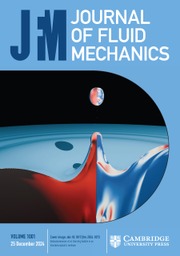Article contents
On the inference of the state of turbulence and mixing efficiency in stably stratified flows
Published online by Cambridge University Press: 21 March 2019
Abstract
Scaling arguments are presented to quantify the widely used diapycnal (irreversible) mixing coefficient  $\unicode[STIX]{x1D6E4}=\unicode[STIX]{x1D716}_{PE}/\unicode[STIX]{x1D716}$ in stratified flows as a function of the turbulent Froude number
$\unicode[STIX]{x1D6E4}=\unicode[STIX]{x1D716}_{PE}/\unicode[STIX]{x1D716}$ in stratified flows as a function of the turbulent Froude number  $Fr=\unicode[STIX]{x1D716}/Nk$. Here,
$Fr=\unicode[STIX]{x1D716}/Nk$. Here,  $N$ is the buoyancy frequency,
$N$ is the buoyancy frequency,  $k$ is the turbulent kinetic energy,
$k$ is the turbulent kinetic energy,  $\unicode[STIX]{x1D716}$ is the rate of dissipation of turbulent kinetic energy and
$\unicode[STIX]{x1D716}$ is the rate of dissipation of turbulent kinetic energy and  $\unicode[STIX]{x1D716}_{PE}$ is the rate of dissipation of turbulent potential energy. We show that for
$\unicode[STIX]{x1D716}_{PE}$ is the rate of dissipation of turbulent potential energy. We show that for  $Fr\gg 1$,
$Fr\gg 1$,  $\unicode[STIX]{x1D6E4}\propto Fr^{-2}$, for
$\unicode[STIX]{x1D6E4}\propto Fr^{-2}$, for  $Fr\sim \mathit{O}(1)$,
$Fr\sim \mathit{O}(1)$,  $\unicode[STIX]{x1D6E4}\propto Fr^{-1}$ and for
$\unicode[STIX]{x1D6E4}\propto Fr^{-1}$ and for  $Fr\ll 1$,
$Fr\ll 1$,  $\unicode[STIX]{x1D6E4}\propto Fr^{0}$. These scaling results are tested using high-resolution direct numerical simulation (DNS) data from three different studies and are found to hold reasonably well across a wide range of
$\unicode[STIX]{x1D6E4}\propto Fr^{0}$. These scaling results are tested using high-resolution direct numerical simulation (DNS) data from three different studies and are found to hold reasonably well across a wide range of  $Fr$ that encompasses weakly stratified to strongly stratified flow conditions. Given that the
$Fr$ that encompasses weakly stratified to strongly stratified flow conditions. Given that the  $Fr$ cannot be readily computed from direct field measurements, we propose a practical approach that can be used to infer the
$Fr$ cannot be readily computed from direct field measurements, we propose a practical approach that can be used to infer the  $Fr$ from readily measurable quantities in the field. Scaling analyses show that
$Fr$ from readily measurable quantities in the field. Scaling analyses show that  $Fr\propto (L_{T}/L_{O})^{-2}$ for
$Fr\propto (L_{T}/L_{O})^{-2}$ for  $L_{T}/L_{O}>O(1)$,
$L_{T}/L_{O}>O(1)$,  $Fr\propto (L_{T}/L_{O})^{-1}$ for
$Fr\propto (L_{T}/L_{O})^{-1}$ for  $L_{T}/L_{O}\sim O(1)$, and
$L_{T}/L_{O}\sim O(1)$, and  $Fr\propto (L_{T}/L_{O})^{-2/3}$ for
$Fr\propto (L_{T}/L_{O})^{-2/3}$ for  $L_{T}/L_{O}<O(1)$, where
$L_{T}/L_{O}<O(1)$, where  $L_{T}$ is the Thorpe length scale and
$L_{T}$ is the Thorpe length scale and  $L_{O}$ is the Ozmidov length scale. These formulations are also tested with DNS data to highlight their validity. These novel findings could prove to be a significant breakthrough not only in providing a unifying (and practically useful) parameterization for the mixing efficiency in stably stratified turbulence but also for inferring the dynamic state of turbulence in geophysical flows.
$L_{O}$ is the Ozmidov length scale. These formulations are also tested with DNS data to highlight their validity. These novel findings could prove to be a significant breakthrough not only in providing a unifying (and practically useful) parameterization for the mixing efficiency in stably stratified turbulence but also for inferring the dynamic state of turbulence in geophysical flows.
- Type
- JFM Papers
- Information
- Copyright
- © 2019 Cambridge University Press
References
- 45
- Cited by


